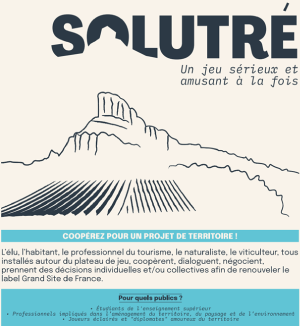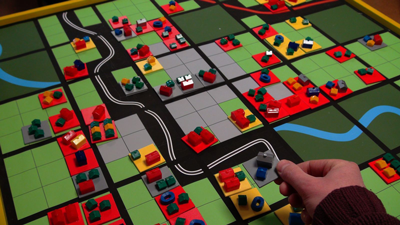On this page you will find a list of serious games produced as part of projects carried out at the research centre.
Covadéo - Collection, visualization and analysis of geo-historical road data

The COVADEO project began with the collection of old maps of the Bourgogne-Franche-Comté region. What these maps share in common is that they allow the road network to be read. To date, 440 maps have been collected, 286 of which have been georeferenced. The maps come from a variety of sources, including departmental archives, municipal libraries and Gallica (part of the Bibliothèque nationale de France). They were then stored in a geo-historical database, the structure of which was designed to allow optimum data storage and access. The idea behind the project is to combine this database with a serious online game to vectorize the road network shown on the old maps. The vectorized data will then be used to carry out quantitative and qualitative analyses of how the networks have changed over time. The project is supported by Bourgogne-Franche-Comté Regional Council, UBFC and the ThéMA research centre.
Game website : https://covadeo.univ-fcomte.fr/
Contact : Claire Lagesse
Solutré serious game - Semi-cooperative board game on sustainable planning and development

The game has been designed on the basis of a territorial diagnosis, so players can experience the territorial governance of a protected natural asset in a rural setting, based on the case of the Solutré Pouilly Vergisson Grand Site de France.
The players are encouraged to adopt the point of view and take the decisions of different stakeholders with the aim of managing an area together. Elected representatives, local residents, tourism professionals, naturalists and winegrowers all cooperate, discuss, negotiate and take individual and/or collective decisions to renew the Grand Site de France label. In concrete terms, over the course of the game’s five rounds, they carry out actions by placing hexagons on the board. The hexagons represent rural development actions, such as producing wine, organizing eco-activities, building a hotel, a health centre or restoring dry stone walls. The players will have to work together to meet the challenges of sustainability, sometimes to the detriment of their personal interests (for example, building as much housing as possible, promoting eco-tourism, creating a nature reserve, etc.). Their challenge will be to find a balance between collective and individual objectives, while taking into account the complexity of the area and the dynamics among the different stakeholders.
The game was created by Anne Jégou (ThéMA), Damien Marage (ThéMA), Nicolas Becu (UMR LIENSs), Brice Anselme (UMR Prodig), Catherine Carré and Laurent Simon (UMR Ladyss), and Marion Lamiral, and funded by the RITM-BFC educational innovation research programme (University of Burgundy, University of Franche-Comté), the DREAL Bourgogne-Franche-Comté and the MSH in Dijon.
The serious Game has been rewarded by the Best Serious Game 2024 award (ISAGA – International Simulation and Gaming Association).
Game website : https://blog.u-bourgogne.fr/seriousgamesolutre/2025/09/10/you-can-play-solutre-in-english/
Contacts : Anne Jégou, Damien Marage
City planner

The aim of this game is to familiarize players with the main principles of town and country planning through a board game that involves developing a village centre in keeping with sustainable development rules. In this collaborative game, the players each take on the role of a stakeholder with their own interests, but they must all comply with five set planning rules: limiting urban sprawl, limiting urban densification, preserving wildlife in the city, protecting forests and rivers, and adhering to a 20% social housing quota.
The game is played in six stages, representing the length of a municipal term of office. At each stage, players will have to make choices and adapt their project to new challenges. The game can be played with or without roles for the players: the mayor, the town planner, the developer, the farmer, the environmental association and the historic residents.
Game developed by the ThéMA and LISER (Institute of Socio-Economic Research) research centres and the Compagnie des rêves urbains between 2013 and 2019.
Download the print and play version
Contact : Yohan Sahraoui
